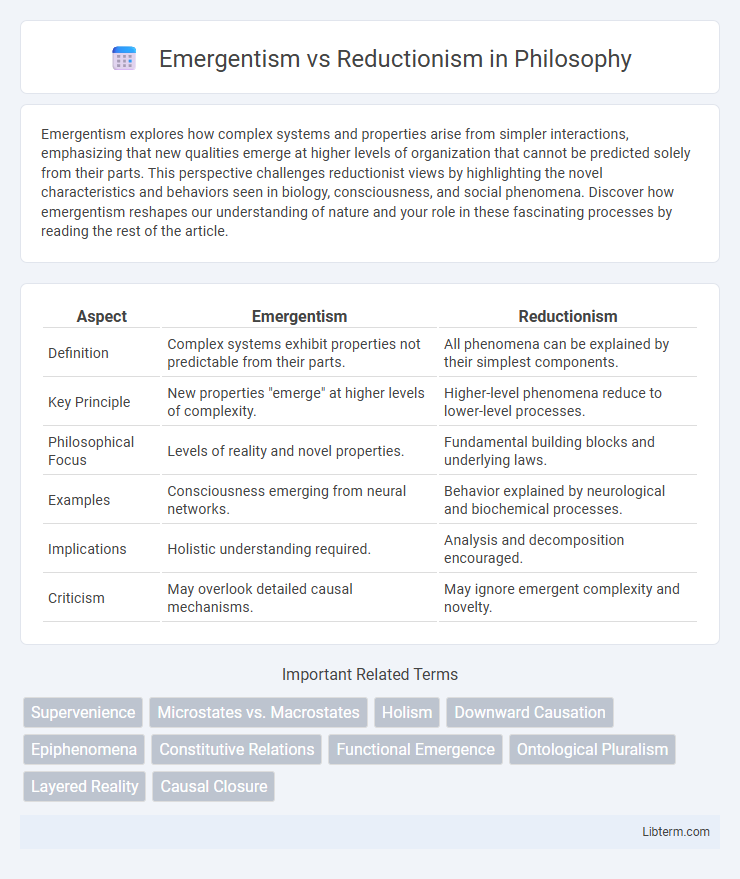Emergentism explores how complex systems and properties arise from simpler interactions, emphasizing that new qualities emerge at higher levels of organization that cannot be predicted solely from their parts. This perspective challenges reductionist views by highlighting the novel characteristics and behaviors seen in biology, consciousness, and social phenomena. Discover how emergentism reshapes our understanding of nature and your role in these fascinating processes by reading the rest of the article.
Table of Comparison
| Aspect | Emergentism | Reductionism |
|---|---|---|
| Definition | Complex systems exhibit properties not predictable from their parts. | All phenomena can be explained by their simplest components. |
| Key Principle | New properties "emerge" at higher levels of complexity. | Higher-level phenomena reduce to lower-level processes. |
| Philosophical Focus | Levels of reality and novel properties. | Fundamental building blocks and underlying laws. |
| Examples | Consciousness emerging from neural networks. | Behavior explained by neurological and biochemical processes. |
| Implications | Holistic understanding required. | Analysis and decomposition encouraged. |
| Criticism | May overlook detailed causal mechanisms. | May ignore emergent complexity and novelty. |
Understanding Emergentism and Reductionism
Emergentism emphasizes that complex systems exhibit properties and behaviors that cannot be fully explained by analyzing their individual components, highlighting novel features arising from interactions. Reductionism seeks to understand phenomena by breaking them down into their basic parts, aiming to explain the whole solely through its constituent elements. Understanding emergentism provides insight into holistic complexity, while reductionism offers clarity through detailed analysis, both crucial in scientific inquiry.
Historical Development of Both Theories
Emergentism and Reductionism developed as contrasting philosophical approaches to understanding complex phenomena, with Reductionism rooted in the 17th-century scientific revolution emphasizing the analysis of systems by their smallest parts, famously advanced by thinkers like Descartes and Newton. Emergentism gained prominence in the 19th and 20th centuries through figures such as John Stuart Mill and C.D. Broad, highlighting properties and behaviors that arise at higher levels of organization and cannot be fully explained by their components alone. The historical evolution of these theories reflects ongoing debates in philosophy of science regarding the limitations of reductionist explanations versus the recognition of new qualities emerging from complex interactions.
Core Principles of Emergentism
Emergentism centers on the idea that complex systems exhibit properties and behaviors that cannot be fully explained by their individual components, emphasizing the novelty and unpredictability arising from interactions within the system. Core principles include the irreducibility of emergent properties, meaning these properties are not deducible from lower-level phenomena, and the notion of systemic causation where emergent phenomena influence the behavior of constituent parts. This framework contrasts with reductionism, which seeks to explain complex phenomena solely through their simplest elements and underlying mechanisms.
Core Principles of Reductionism
Reductionism centers on the principle that complex systems can be understood entirely by analyzing their individual parts and the interactions between them. It asserts that all phenomena, including biological, psychological, and social processes, can be explained by more fundamental components such as molecules, atoms, and physical laws. This approach emphasizes hierarchical organization, where higher-level properties are seen as reducible to lower-level mechanisms.
Philosophical Foundations and Influences
Emergentism posits that complex systems exhibit properties and behaviors not reducible to their individual components, emphasizing holistic interactions rooted in philosophy of mind and systems theory. Reductionism, grounded in scientific positivism and logical empiricism, asserts that all phenomena can be explained by analyzing their simplest parts and underlying physical laws. These philosophical foundations shape their influence across disciplines, with emergentism inspiring studies in consciousness and complexity, while reductionism underpins analytical methodologies in physics and biology.
Key Differences Between Emergentism and Reductionism
Emergentism emphasizes that complex systems exhibit properties and behaviors that cannot be fully explained by their individual components, highlighting the importance of novel qualities arising at higher levels of organization. Reductionism, in contrast, seeks to understand phenomena by breaking them down into their most basic parts, asserting that all complex systems can be explained through their fundamental elements and interactions. The key difference lies in emergentism's focus on holistic properties and reductionism's focus on analytical decomposition.
Applications in Science and Technology
Emergentism in science and technology emphasizes the understanding of complex systems where higher-level properties arise from interactions among simpler components, crucial in fields like artificial intelligence and neuroscience for modeling cognition and behavior. Reductionism drives advances in molecular biology and chemistry by breaking down systems into fundamental parts, enabling precise manipulation at atomic and genetic levels for drug development and nanotechnology. Both approaches integrate to enhance innovations in systems biology, robotics, and materials science by correlating micro-level mechanisms with macro-level phenomena.
Debates and Criticisms within Academia
Emergentism argues that complex systems exhibit properties not reducible to their individual components, challenging reductionism's focus on explaining phenomena solely through constituent parts. Critics of emergentism in academia often contend that it lacks empirical rigor and clear mechanisms for how emergent properties arise, while reductionism is criticized for oversimplifying complex phenomena and ignoring system-level interactions. The debate centers on whether scientific explanation should prioritize holistic system properties or rely on fundamental components, influencing research approaches across philosophy of science, cognitive science, and biology.
Case Studies: Examples in Biology and Physics
Emergentism highlights phenomena like consciousness arising from neural networks in biology, where brain function cannot be fully explained by individual neurons alone. In physics, emergent properties such as superconductivity emerge from collective interactions of electrons, defying reductionist explanations based solely on particle behavior. Case studies in both fields illustrate how complex systems exhibit new properties that are irreducible to their components, challenging strictly reductionist approaches.
Future Directions and Implications
Future directions in emergentism emphasize the integration of complex systems theory with artificial intelligence to better understand how novel properties arise from simpler interactions. Reductionism's implications include the continued refinement of molecular and quantum models that drive breakthroughs in personalized medicine and nanotechnology. Combining these approaches promises advancements in interdisciplinary research, enhancing predictive capabilities and innovative solutions across biology, physics, and cognitive science.
Emergentism Infographic

 libterm.com
libterm.com